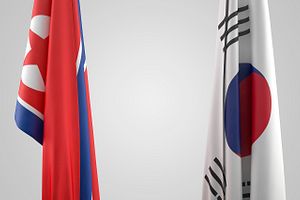President Moon Jae-in reshuffled his national security team last week, filling key posts in charge of handling security and North Korean affairs with figures who have been deeply involved in deals with the North.
The message is clear: South Korea hopes to continue its efforts to enhance inter-Korean reconciliation. Inter-Korean relations have deteriorated rapidly in recent months in the wake of a series of provocations from the North, including the demolition of the liaison office and a military threat.
Worried about relations with Pyongyang, which is one of Moon administration’s key interest areas, Seoul has turned to figures with accommodative stances on Pyongyang –what some critics term “pro-North Korea” attitudes. This in turn has raised concerns the reshuffle might weaken South Korea’s national security.
Park Jie-won, who has been appointed as the chief of the country’s spy agency, the National Intelligence Service (NIS), is among the officials facing scrutiny.
Park was one of the leading figures in organizing the first inter-Korean summit in 2000 and is known to have a strong network of contacts in the North.
However, it later turned out that Park played a key role in secretly sending $450 million from South Korea’s Hyundai group to the North ahead of the summit, for which he was sentenced to three years in prison.
“It appears that South Korean presidents regard the NIS as a secret agent carrying out their agenda, not as an intelligence agency responsible for the nation’s safety,” the country’s conservative daily Chosun Ilbo said in an editorial, raising its concern over the reshuffle.
The NIS is the foremost security agency in existence to protect South Korea from all external threats, and North Korea is merely part of its scope. The leader of the NIS should have experience and knowledge on all threats to South Korea’s security amid a flurry of intelligence related to overseas, cyberattacks, and anti-terrorism, the paper said.
Chosun Ilbo furthered charged that Park’s domestic political focus made him an unwise choice, as the NIS closely cooperates with the United States and Japan.
There has also been persistent concern over Im Jong-seok, Moon’s former chief of staff who has been appointed as a special adviser for foreign policy and national security.
Im is widely seen as a pro-North Korea figure due to his resume. Im was head of the National Council of Student Representatives in 1989 and served three and a half years in prison for facilitating activist Lim Su-kyung’s unauthorized visit to North Korea in violation of the National Security Law.
Some critics believe that Im would be highly likely to oppose hard-line policies toward Pyongyang, which could cause a disagreement between the South and the United States.
North Korea responded immediately. A day after Moon announced the reshuffle, the North released a statement under the name of Choe Son-hui, first vice minister of foreign affairs, to say there is no reason to sit down and talk to the United States.
Based on the North’s previous moves, however, the statement could be a sign of Pyongyang indirectly showing its interest in a possible return to the negotiation table with Washington.
In particular, messages such as “the topic of the North-U.S. summit is drawing the attention of the international community” or “there is rumor that the U.S. ruling quarters admits the need to hold DPRK-U.S. summit before the U.S. presidential election” could be an indirect indication of such interest.
It could also be a message to the South. The statement said, “There is a person who thoughtlessly voices an intention to mediate the summit, utterly regardless of what we, the dialogue party, would think of it.” Many read this as a message to Seoul, continuing previous demands for the South to lean more toward the North in its efforts to mediate between Pyongyang and Washington.
That possibility might seem more feasible from Pyongyang’s point of view now that the South’s top jobs for the national security and North Korean affairs are all filled with figures with an accommodative stance on the North.

































